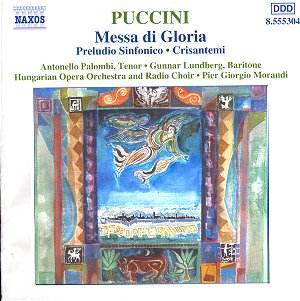A complaint occasionally voiced about
Puccini’s Mass is that it is too "operatic". So what? Many
of the most admired sacred works of the early baroque period are operatic:
Monteverdi and Cavalli were shining examples of how great composers
can serve two masters, the church and opera, equally well. Whether the
young Puccini had then mastered the necessary skills for doing so is,
however, open to question. The Messa di Gloria was completed
in 1880 while he was still a student, but did not come to light again
until 1950. It has all the suave melodic qualities of Puccini’s stage
works, and receives a committed performance on this disc.
Puccini constantly underlays the texts
with colourful orchestral writing, and in a few places the choir is
all but upstaged by instrumental passages. The effect, though often
impressive, is strangely uneven, as though the composer has casually
drawn on secular sources for a sacred work. The Gloria has an
unexpectedly dancing step. The four-part choral singing is accomplished
throughout, but the high tessitura of Gratias animus tibi does
Palombi’s voice no favours. The Mass is full of jolly tunes (including
one in a decidedly waltz-like tempo) and clearly this is the work of
a young composer determined to sweep away the cobwebs from conventional
liturgical settings. The gentle Kyrie and Benedictus are,
perhaps, the most overtly devotional sections, and Lundberg’s fine bass
makes an impressive contribution to the latter. Considering the inspired
way Puccini uses the soprano voice in his operas it is surprising that
he did not find a place for it in the Mass.
After the Mass the two purely orchestral
pieces on this disc, Preludio Sinfonico and Crisantemi
(chrysanthemums), sound like makeweights. The former is short
at 9:52, and gives the impression of an intermezzo looking for an opera.
The latter, a brief elegy for Amedio de Savoy, Duke of Aosta, has a
genuinely felt poignancy in contrast to the sketchy treatment of the
Prelude. Recording quality is high, using 30-bit technology to improve
definition and sound reproduction.
Roy D.Brewer


